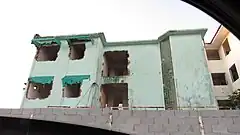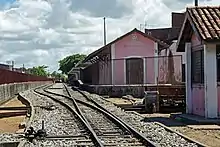 Damaged building in the Pinheiro neighborhood | |
| Date | February 2018 – present |
|---|---|
| Location | Maceió, Alagoas, Brazil |
| Cause | rock salt mining |
| Property damage | around 14.000 buildings |
The sinking of Maceió ground is a geological process of soil subsidence in several neighborhoods of the Brazilian city of Maceió, capital of the state of Alagoas, of an anthropogenic nature, caused by the inadequate exploitation and consequent collapse of the rock salt mines of the Brazilian mining company Braskem.[1][2]
The city undergoes a slow process of soil subsidence that is causing damage to various structures, such as streets, houses and urban infrastructure. Around 60,000 people have been forced to leave their homes and properties.[3] Entire neighborhoods are under risk of destruction,[4][5] such as Pinheiro, Bom Parto, Mutange, Bebedouro and part of Farol.[4]
History and causes
The cause of the subsidence is attributed to the impact of four decades of mining the soil to extract rock salt, an ore used to manufacture items such as caustic soda and PVC, by Braskem.[4][6][7] The first cracks in the ground were identified in the Pinheiro neighborhood in February 2018, after heavy rains.[8] Two weeks later, the asphalt in some streets has caved in and cracks in buildings have widened following an earthquake.[9]
Researchers from the Federal University of Alagoas (UFAL) have been pointing out the risk of ground subsidence in Maceió due to mining activities since at least 2010, and warnings were issued thirty years earlier, in the 1980s, by two professors from the university.[10]
It was only a year after these episodes, in May 2019, that the Geological Survey of Brazil (CPRM), a research body linked to the Ministry of Mines and Energy, confirmed the relationship between the ground subsidence and the company's mining activities, in a report presented at the headquarters of the Federal Court in Alagoas.[6] Throughout the exploration period, the company exploited 35 mines, and over time, some of them ended up merging into cavities more than 100 meters wide.[11]
According to the study, the exploitation of rock salt was carried out improperly, destabilizing the pre-existing caves and causing the fissures.[6] At that time, the risk area, which until then was considered to be concentrated in the Pinheiro neighborhood, was extended to the Mutange and Bebedouro neighborhoods.[6] New areas would be identified later.
On 30 November 2023, the city of Maceió decreed a state of emergency in the municipality for 180 days due to the "imminent collapse" of a mine belonging to Braskem in the area of Mundaú Lagoon, in the Mutange neighborhood.[12] The city's civil defense authority reported the partial collapse of the mine on 10 December.[13]
Affected population
There is no precise data on the number of people affected by the ground-sinking disaster. In May 2022, the Municipality of Maceió held a meeting with the Brazilian Institute of Geography and Statistics (IBGE) to request support in collecting and cross-referencing the information with other bodies of the Municipal Administration.[14]
An estimated 55,000 people have been affected since 2018, including residents and businesses, and 14,000 properties have been condemned in the five neighborhoods affected: Bebedouro, Bom Parto, Farol, Mutange and Pinheiro.[4] In the most current estimates, the city of Maceio mentions 64 thousand people.[7]
The problems caused by the sinking, which include environmental, social, and economic issues, are wide-ranging and are still being investigated. In addition to dissatisfaction with the agreements proposed by Braskem, residents are still living with accelerated growth in the population of stray cats and mosquitoes; some refuse to leave the risk areas, which have been periodically updated on official City Hall maps since 2019.[5]
Damages to heritage

The Bebedouro neighborhood, one of those affected by the subsidence, is one of the oldest districts in Maceió, almost 200 years old.[5][15] Buildings listed by the state and municipal historical heritage departments are located there, such as:
- Asylo das Órphans Desvalidas de Nossa Senhora do Bom Conselho, a 1877 building created to house orphans of the Paraguayan War and which operated as a public school until the sinking process began;[5]
- St. Anthony of Padua Church, which has been in operation since at least 1870, and remains open, despite being in an area of risk.[16]
The City of Maceió has made an initial survey of 20 addresses with properties of historical interest among the neighborhoods affected but has not yet made it public. Braskem also states that it is carrying out a study on the situation of the historic heritage affected.[15]
Authorities' response
Following the submission of a report by the Federal Geological Survey,[6] the federal government acknowledged, on 28 May 2019, the state of public calamity in Maceió, facilitating the possibility of financial and technical support for the region. The Prefecture had already declared a state of calamity months earlier, in March 2019.[17]
On 30 December 2019, an agreement was signed between the Alagoas State Public Prosecutor's Office (MPE-AL), the Alagoas State Public Defender's Office (DPE-AL), the Federal Public Prosecutor's Office (MPF), the Federal Public Defender's Office (DPU) and the Braskem mining company. The document, called the "Agreement to Support the Eviction of Risk Areas", aims to establish parameters for the relocation of residents and financial compensation for those affected and property owners in the affected neighborhoods.[18]
The Maceio City Hall created the Integrated Management Office for the Adoption of Measures to Address the Impacts of the Sinking of Neighborhoods (GGI Bairros), through Decree No. 9.037 of 6 January 2021.[19] Among other functions, the body is responsible for listening to and talking to the actors involved in the process and other public authorities and institutions.[20]
In October 2019, an External Commission was set up in the Chamber of Deputies to monitor the damage caused by the sinking and held public hearings and official visits to the region.[21]
Lawsuits
Braskem doesn't officially admit to having caused the disaster. Still, it has already signed an agreement in the Alagoas courts that provides for the payment of more than 12 billion reais to compensate residents and shopkeepers, as well as the relocation of public facilities such as schools and health units.[5]
A group of Maceió residents, represented by three law firms, have filed a lawsuit against Braskem in Rotterdam, the Netherlands, claiming that the compensation offered by the company does not cover all the damages.[22] On 17 May 2022, the residents of the affected areas were heard by the Rotterdam District Court.[23]
On 21 September 2022, the Court ruled that it had jurisdiction to hear the case and admitted the action against the petrochemical company, since three of its subsidiaries operate in Dutch territory.[24]
Learn more
Project
- Caranto Media (4 December 2022). Histórias do Subsolo [Stories of the Underground]. Retrieved 17 December 2023.
- RELU (January 2021). Inventário Participativo do Patrimônio de Maceió em Subsidência [Participatory Inventory of Maceió's Heritage in Subsidence]. Grupo Representações do Lugar - RELU (in Brazilian Portuguese). Retrieved 7 December 2023.
Documentary film
- Pronzato, Carlos (5 August 2021). A BRASKEM PASSOU POR AQUI: A catástrofe de Maceió [BRASKEM WAS HERE: The catastrophe in Maceió]. Lamestiza Audiovisual (in Brazilian Portuguese). Retrieved 7 December 2023.
- MPF (4 June 2021). Cidade Rachada: atuação do MPF no caso do afundamento dos bairros em Maceió (AL) [Cracked City: MPF action in the case of the sinking of Maceió]. Ministério Público Federal - MPF (in Brazilian Portuguese). Retrieved 7 December 2023.
See also
References
- ↑ "Brazilian petrochemical company settles with the city where mining destroyed entire neighborhoods". AP News. 21 July 2023. Retrieved 3 December 2023.
- ↑ "Brazil's Braskem sued over sinking ground from Alagoas mines". Reuters. 30 November 2023. Retrieved 3 December 2023.
- ↑ "INFOGRÁFICO: Entenda o risco de colapso das minas da Braskem em Maceió". G1 (in Portuguese). 1 December 2023. Retrieved 2 December 2023.
- 1 2 3 4 "Afundamento do solo em Maceió pode durar até 10 anos; entenda a formação dos bairros fantasmas". G1. Retrieved 3 December 2021.
- 1 2 3 4 5 "Chão da capital de Alagoas está cedendo devido ao colapso de cavernas subterrâneas. O desastre provocou a remoção emergencial de cerca de 65 mil pessoas". Metrópoles. 13 May 2021. Retrieved 3 December 2021.
- 1 2 3 4 5 "Serviço Geológico confirma relação das ações da Braskem com as rachaduras no Pinheiro, Mutange e Bebedouro". G1 (in Portuguese). Retrieved 18 October 2022.
- 1 2 "Bairros afundando transformam parte de Maceió em cidade fantasma e atraem curiosos". BBC News Brasil (in Portuguese). Retrieved 18 October 2022.
- ↑ "Rachaduras surgem no bairro do Pinheiro após fortes chuvas e intrigam Defesa Civil de Maceió". G1 (in Portuguese). Retrieved 18 October 2022.
- ↑ "Tremor de terra é registrado em vários bairros de Maceió". G1 (in Portuguese). Retrieved 18 October 2022.
- ↑ "Pesquisadores da Ufal alertavam para riscos de afundamento desde 2010". Universidade Federal de Alagoas (in Portuguese). Retrieved 1 December 2023.
- ↑ Tribuna Hoje, 2i9 NEGÓCIOS DIGITAIS-. "Documentos indicam que a mina 7 já foi 42% preenchida pela Braskem". Tribuna Hoje. Retrieved 18 October 2022.
{{cite web}}: CS1 maint: numeric names: authors list (link) - ↑ "Maceió decreta situação de emergência por risco de colapso em mina da Braskem - SBT News". www.sbtnews.com.br (in Portuguese). Retrieved 1 December 2023.
- ↑ "Petrochemical giant's closed salt mine partially collapses in northeastern Brazil". AP News. 10 December 2023. Retrieved 10 December 2023.
- ↑ "Prefeitura discute parceria com IBGE para coleta de dados de…". Prefeitura de Maceió. Retrieved 18 October 2022.
- 1 2 "Patrimônio fantasma". noticias.uol.com.br (in Portuguese). Retrieved 18 October 2022.
- ↑ Sampaio, João Arthur. "Conheça a história da Igreja centenária dedicada a Santo Antônio que pode desaparecer". 7Segundos (in Portuguese). Retrieved 18 October 2022.
- ↑ "Governo Federal reconhece estado de calamidade pública em Maceió por rachaduras no solo". G1 (in Portuguese). Retrieved 18 October 2022.
- ↑ "Termo de Acordo para Apoio na Desocupação das Áreas de Risco" (PDF). Prefeitura de Maceió. Retrieved 18 October 2022.
- ↑ Act of 6 January 2021 (PDF).
- ↑ "SOBRE O GGI". Prefeitura de Maceió. Retrieved 18 October 2022.
- ↑ "COMISSÃO EXTERNA SOBRE AFUNDAMENTO DO SOLO EM MACEIÓ". Portal da Câmara dos Deputados (in Portuguese). Retrieved 18 October 2022.
- ↑ "Moradores de bairros atingidos por rachaduras em Maceió acompanham audiência contra Braskem na Holanda". G1. 16 May 2022. Retrieved 3 July 2022.
- ↑ "Justiça holandesa define data para anunciar se processo de moradores de Maceió contra Braskem será julgado no país". G1. 17 May 2022. Retrieved 3 July 2022.
- ↑ "Tribunal holandês admite processo de Maceió contra gigante petroquímica". noticias.uol.com.br (in Portuguese). Retrieved 18 October 2022.